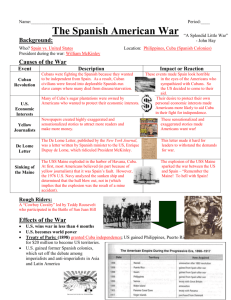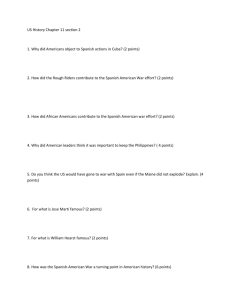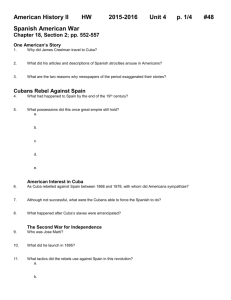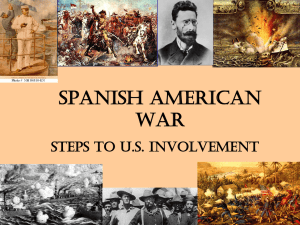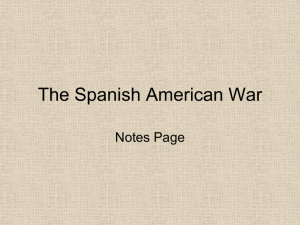The White Man's Burden
advertisement
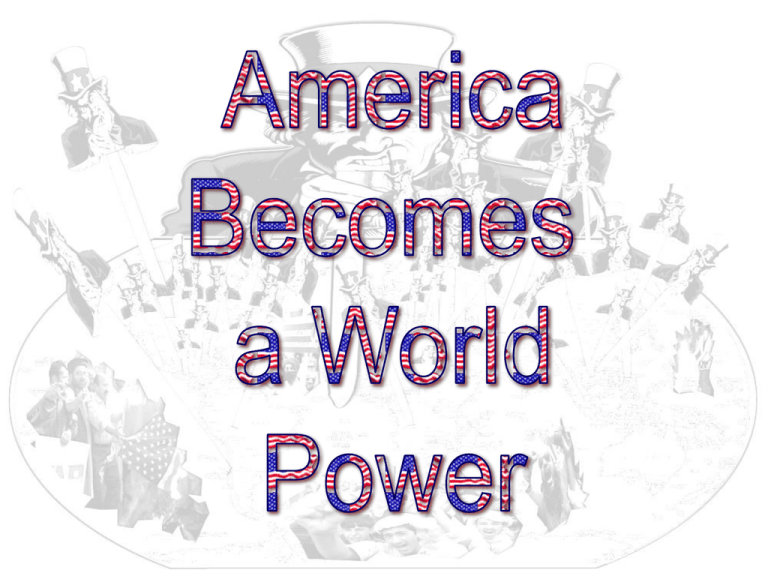
• Take out a sheet of paper & fold it vertically to create TWO columns. • Left Column: Label “White Man’s Burden” • Right Column: Label “Beliefs About Race & the Other” • LISTEN to the film and jot down notes related to the above concepts…think about meanings/ideologies, causes & effects of these ideas… • What role did beliefs about race play in the American colonization of Mexican territory, Cuba, the Philippines, Guam and Puerto Rico? • Organizers of the 1904 St. Louis World’s Fair put on display people whom they defined as “other.” What characterizes those who are defined as different? New Manifest Destiny Developments 1. Subjugation of Indian tribes established a precedent for “control over dependent people.” New Manifest Destiny Developments 2. Closing of the Frontier – Fear of natural resources dwindling; Overseas adventures might offer outlet/safety valve for restless Americans (Social Protest…) New Manifest Destiny Developments 3. Commercial and Business Interests: Looking for new markets abroad as a result of Depression in 1890s New Manifest Destiny Developments Alfred T. Mahan The Influence of Sea Power on History: 1660-1783 4. Naval Power: Strong navy crucial to a country’s ability to secure foreign markets and become a world power. New Manifest Destiny Developments American Missionaries in China, 1905 5. Religious Motives – Missionaries: “Duty” to colonize other lands for purpose of spreading Christianity and Western Civilization. New Manifest Destiny Developments The White Man’s Burden The Hierarchy of Race 6. International Darwinism: Strong nations will (should) dominate weak ones…survival of the fittest. • Cuba a colony of Spain • Cuban Revolt: – Bands of Cuban nationalists fighting for 10 years to overthrow Spanish colonial rule – 1895, adopt the strategy of sabotaging and destroying Cuban plantations to either force Spain’s withdrawal or involve the United States • Why would the U.S. be interested? Up until this point…American people sympathized with Cubans but the U.S. never intervened… • BUT…American companies owned several sugar mills and plantations in Cuba! • Now they’re INTERESTED…Cleveland did not react but McKinley did. – Spain responds with placing the rebels in guarded camps (Reconcentration camps) – dismal conditions – Estimated 200,000 Cubans died in the camps Valeriano Weyler’s “Reconcentration” Policy General Valeriano Weyler understood very quickly that the key to a Spanish victory over the insurgents was to strip the guerrillas of their abilities to live off the land and camouflage themselves in groups of civilians. To this end, he began a policy of moving Cuban civilians to central locations where they would be under the control of the Spanish army. In addition, he put the entire island under martial law. The policy had disastrous consequences. Unlike many concentration camps in the twentieth century, the idea was to keep the Cuban civilians alive and protected until the Spanish were victorious. Unfortunately at least 30% perished from lack of proper food, sanitary conditions, and medicines. The policy generated severe anti-Spanish feeling in the United States which helped propel it into war in 1898. Finally, it did not benefit the Spanish in the war. “Yellow Journalism” & Jingoism Joseph Pulitzer Hearst to Frederick Remington: You furnish the pictures, and I’ll furnish the war! William Randolph Hearst Jingoism – extreme patriotism that includes war as foreign policy measure De Lôme Letter Dupuy de Lôme, Spanish Ambassador to the U.S. Criticized President McKinley as weak and a bidder for the admiration of the crowd, besides being a would-be politician who tries to leave a door open behind himself while keeping on good terms with the jingoes of his party. Theodore Roosevelt Assistant Secretary of the Navy in the McKinley administration. Imperialist and American nationalist. Criticized President McKinley as having the backbone of a chocolate éclair! Eventually, resigns his position to fight in Cuba. Remember the Maine and to Hell with Spain! Funeral for Maine victims in Havana The Spanish-American War (1898): “That Splendid Little War” McKinley’s War Message: 1. “Put an end to the barbarities, bloodshed, starvation, and horrible miseries” in Cuba 2. Protect the lives and property of U.S. citizens living in Cuba 3. End “the very serious injury to the commerce, trade, and business of our people” 4. End “the constant menace to our peace” arising from the disorders in Cuba • Congress passed a resolution authorizing war…(but the Teller Amendment stated the U.S. had no intention of taking political control of Cuba and that, once peace was restored, the Cubans would control their own government…) Dewey Captures Manila! Emilio Aguinaldo Leader of the Filipino Uprising. July 4, 1946: Philippine independence The American Anti-Imperialist League Founded in 1899. Mark Twain, Andrew Carnegie, William James, and William Jennings Bryan among the leaders. Campaigned against the annexation of the Philippines and other acts of imperialism. The Invasion of Cuba The “Rough Riders” The Treaty of Paris: 1898 Cuba was freed from Spanish rule. Spain gave up Puerto Rico and the island of Guam. The U.S. paid Spain $20 mil. for the Philippines. The U.S. becomes an imperial power!

